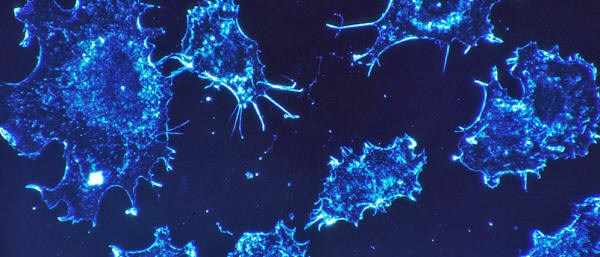|

by Neil C. Bhavsar and Kristin Houser
March 28,
2017
from
Futurism Website

In
Brief
Scientists have published new research that suggests
up to 60% of cancers could be caused by random DNA
mutations, rendering those cancers completely
unavoidable.
The other
40%, however, could be prevented via diet, exercise,
and other environmental factors.
Preventing the
Medical Malady
Cancer, the emperor of all maladies, is tragic under most any
circumstances, but it's even worse when the condition could have
been prevented.
Scientists estimate that
40 percent of all cancers
are preventable, and those figures
include several types you may think of right away, such as lung
cancer (the most deadly) and skin
cancer (the most preventable).
Thanks to improved diagnostics and
surveillance technologies, early cancer detection is one benefit
of living in the 21st century. But how do we go about preventing the
40 percent of cancers that are preventable?
The World Health Organization
(WHO)
cautions against
the use of tobacco, which
is known to be the single greatest risk factor for developing
cancer.
Tobacco-caused cancer kills about six
million people each year, and tobacco smoking, second-hand smoke,
and smokeless tobacco (chewing tobacco) all contribute considerably
to the development of cancer.
Another factor in the development of
cancer is physical fitness. Research has shown
a link between being overweight or obese and
cancers of the kidney, breast, esophagus, and colon.
The
maintenance of a normal body weight
through a healthy diet consisting of ample fruit and vegetables and
a regular exercise regimen are a solid start to reducing
the risk of cancer as a whole.
According to the WHO, a third risk
factor is alcohol, which is estimated to be responsible for more
than 300,00 cancer deaths yearly. The substance can cause cancer of
the mouth, liver, breast, or colon.
However, the risk of cancer is
dependent on how much alcohol is consumed, so moderate amounts
shouldn't be the source of too much worry.
So that's 40 percent of cancers, but
what about the other 60 percent?
Probability Genetics
In the award-winning television series
"Breaking
Bad," the general conflict arises when a high school
chemistry teacher is unexpectedly diagnosed with lung cancer.
With no history as a smoker,
his 'bad luck' pushes his already
struggling family into further debt to pay his medical bills, which
leads to an interesting plot.
Unfortunately, the brooding
anti-hero's surprising cancer diagnosis might be more common than we
thought.
Scientists Bert
Vogelstein and
Cristian Tomasetti at Johns Hopkins' Sidney Kimmel Cancer
Center have published research (Stem Cell Divisions, Somatic
Mutations, Cancer Etiology, and Cancer Prevention) that suggests
that certain cancers may be simply unavoidable, attributing their
cause to
DNA mutations.
Mutations occur each time our
cells divide.
Usually, these mutations take
place in segments of DNA that aren't very important.
However, if a mutation occurs in a cancer driver gene, we
might suffer from some bad luck.
In their paper, Vogelstein and
Tomasetti report that 66 percent of mutations are random, 29
percent are caused by environmental factors, and 5 percent
are due to hereditary factors.
The JHU team asserts that
these mutations aren't the be-all-end-all of cancer -
they're just one factor in the process of its development.
To that end,
other scientists suggest
that we must study the interplay of other factors, such as
hormones, with genetic mutations to get a better
understanding of the whole picture.
While learning that the
majority of cancers appear to be unavoidable isn't the most
heartwarming news, it does leave us with the knowledge that
the other 40 percent are preventable, giving us some control
over our health with respect to this awful disease.
|


